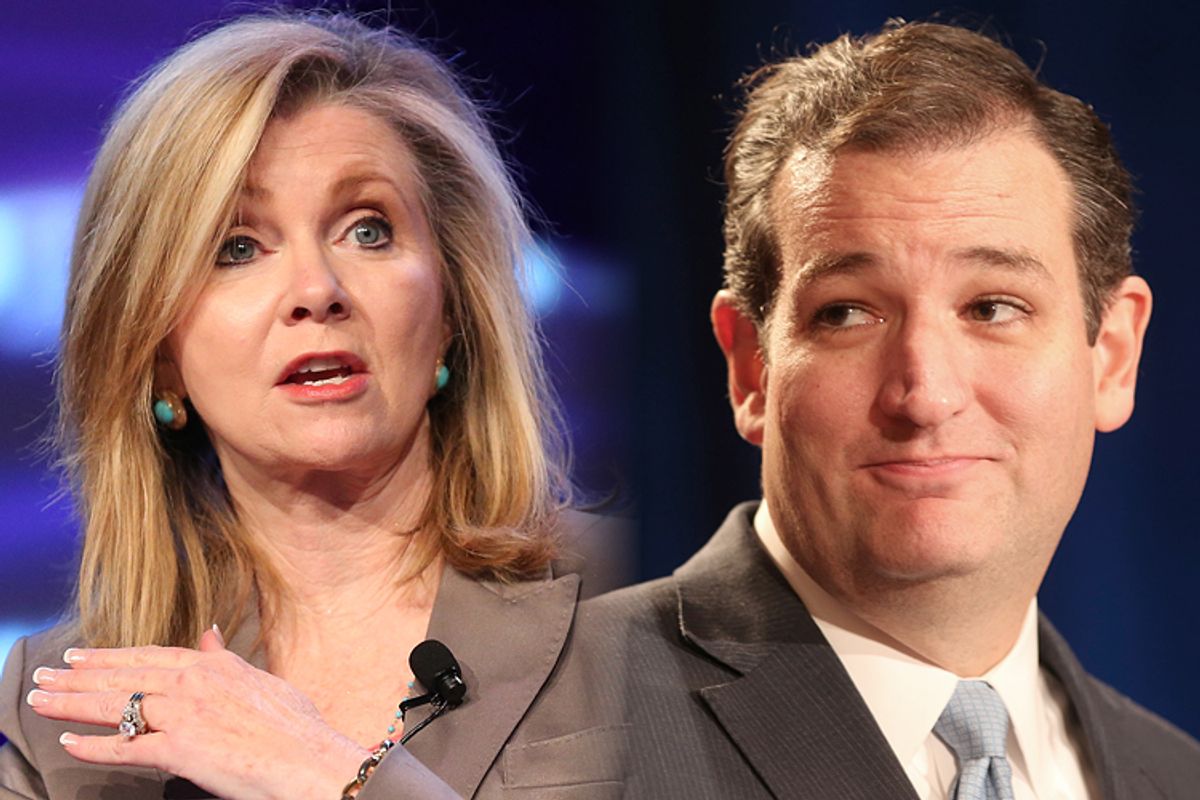Right around noon on Wednesday, the Senate voted to invoke cloture on Sylvia Mathews Burwell’s nomination to be the next secretary of Health and Human Services. The all-out Obamacare brawl that Republicans had promised when Burwell’s nomination was announced never materialized. Instead, it ended with a quiet, respectful display of bipartisan comity.
Losing the opportunity to grandstand on the Burwell nomination, however, was the least of the Republicans’ troubles this week when it came to the Affordable Care Act. We’re only six days into June, and opponents of the ACA have already had a terrible month.
The big news was the release of new data from the White House indicating that enrollment in Medicaid has surged in states that elected to expand the program under the Affordable Care Act. In April alone more than 1 million people signed up for coverage. Medicaid enrollment in states that rejected the expansion has also gone up as people who didn’t know they were eligible started signing up – the so-called Woodwork Effect. Add all those enrollees to the number of people who were on Medicaid or CHIP prior to the ACA’s implementation, and you come up with just over 65 million Americans enrolled in the program.
As Paul Waldman puts it at the Washington Post, this is game over for Republican critics of the law who insist on repealing and replacing the ACA to get government out of healthcare. To do so, they’d have to find a way to transition tens of millions of people off of their government-provided health coverage. “Even if Republicans took back the White House and both houses of Congress,” Waldman writes, “moving people off their government insurance would be next to impossible.” The fight over Obamacare was always going to be a war of attrition, and it was always stacked against the Republicans.
And it’s not just that people are signing up for Medicaid; they’re using it, and early indicators are that expanding access to healthcare is having the intended effect of reducing instances of uncompensated care. The Colorado Hospital Association released a study this week showing that “hospitals in states that chose to expand Medicaid under the Affordable Care Act saw significantly more Medicaid patients and a related reduction in self-pay and charity care cases.” Hospitals are obligated to treat and stabilize emergency room patients regardless of their insurance status or their ability to pay. If they can’t pay, the hospital gets stuck with the bill. Expanding the Medicaid rolls means that more people can seek out care and hospitals will have to absorb less bad debt, which could lead to lower healthcare costs overall.
The popularity of expanded Medicaid sets it apart from the rest of the ACA, which is still broadly disliked. That niche popularity has opened up a narrow path for Democrats to take the offensive on Obamacare and put pressure on Republicans who oppose the expansion. Senate Democrats sent a letter this week to Republican governors in states that rejected expanded Medicaid urging them to “put politics aside and do the right thing in helping to expand Medicaid coverage to the millions of Americans who desperately need it.” Among the signatories to that letter were Sens. Kay Hagan, Mary Landrieu and Mark Begich, all of whom are facing tough reelection fights this cycle.
But let’s get back to practical news. Gallup’s most recent survey found that the uninsured rate thus far in the second quarter of 2014 is 13.4 percent, which is “down from 17.1% in the fourth quarter of 2013 and from the 15.6% average in the first quarter of 2014.” Overall this means that the roughly 11 million people who gained insurance during the ACA’s implementation contributed to a 22 percent drop in the uninsured rate. The rate does seem to be leveling off, per Gallup’s analysis, but the “rate could drop if more states elect to expand Medicaid.”
And as it turns out, there are states that are working to do exactly that. While there are still 20 states holding firm in their refusal to expand Medicaid, four states are either trying to work out compromise packages (Utah, Pennsylvania and Indiana) or locked in an internal battle over whether to accept the expansion (Virginia). Virginia will be interesting to watch both for the national implications of a purple state struggling to come to grips with Obamacare, but also as a test of how far Democratic Gov. Terry McAuliffe is willing to go in his support for the expansion.
That’s a big heap of good news for the Affordable Care Act in just one week. Of course, there were some bumps as well – specifically, a report that data discrepancies for about 2 million people who signed up for private coverage during the open enrollment period could affect their eligibility for subsidies (or lock them out from coverage) if the discrepancies aren’t resolved. As Jonathan Cohn notes, the law was written to anticipate and accommodate this exact problem, and systems are in place to make the needed fixes, so there’s no need to panic (yet).
But all-in-all, in terms of policy outcomes and political wrangling, this week was pretty good for proponents of the Affordable Care Act, and pretty rough for the dwindling sect of hardcore repeal devotees.


Shares